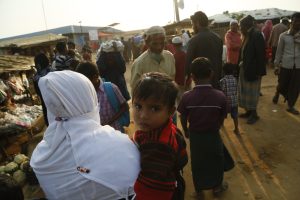Police in Bangladesh police have arrested nearly 40 refugees at the crowded refugee camps in Cox’s Bazar after the killing of a well-known Rohingya community leader last month. According to a report by Benarnews that cited local officials, the Bangladeshi police have undertaken a blitz against criminal activities in the camps, and arrested many suspected of involvement with illegal weapons and drugs.
“Police so far arrested 38 Rohingya from different refugee camps since the murder of Muhib Ullah,” Rafiqul Islam, an additional police superintendent in Cox’s Bazar, told BenarNews on Tuesday. “Law enforcers are continuing the drives to reduce any offenses or illegal activities in refugee camps.”
According to the officials, five of the suspects were arrested in connection with the recent killing of Mohibullah, the head of the Arakan Rohingya Society for Peace and Human Rights (ARSPH), who was reportedly shot and killed by unidentified gunmen outside his office at the Kutupalong refugee camp on September 29.
During a statement before a judge on Saturday, police told BenarNews that one of the suspects confessed to being involved in the killing of the 37-year-old, who was one of the most active advocates of justice and a safe return for the 1 million Rohingya refugees in Bangladesh. The remainder of the suspects were detained for a range of other criminal activities, including the trafficking of methamphetamines and other narcotics.
Another official said that a special hotline number was launched in the Rohingya camps in order to provide a line for anonymous tip-offs of criminal activity. “Camp dwellers were asked to inform the law enforcers about criminals or criminal activities through the hotline,” said police battalion commander Naimul Haque.
Most of the inhabitants of Kutupalong and the other camps around Cox’s Bazar are Muslim Rohingya who fled Myanmar over the past decade. More than 700,000 of the estimated 1.1 million people in the camps arrived in August 2017, when the Myanmar military launched a brutal offensive in the northern part of Rakhine State.
Four years on, the camps have become semi-permanent fixtures where law enforcement is scant and all manner of criminal and illicit activity has been allowed to metastasize. As has happened in similar contexts elsewhere, a number of armed groups have gained prominence in the camps, among them the Islamist Arakan Rohingya Salvation Army, whose attacks on security posts in 2017 were the pretext for the military’s violent “clearance operation.”
Reuters reported in 2019 that the ARSA, which sparked the 2017 offensives with attacks on security posts, was resurgent in the camps, committing kidnappings and other crimes. Whereas groups like ARSPH made incremental steps toward improving the condition in the camps, pursuing justice for the displaced, and working toward the voluntary repatriation of Rohingya communities to Rakhine State, the ARSA – also popularly known as Harakah al-Yaqin, “the movement of the faith” – advocated a much harder line toward the Myanmar government. The group has been suspected of involvement in Mohibullah’s assassination.
As a response to the killing, the Bangladeshi crackdown will help to suppress criminal activity in the short term. But with the unstable conditions in Myanmar conspiring against the voluntary repatriation of Rohingya refugees at any point in the foreseeable future, it will require a much more sustained effort to bring peace and order to the camps in Cox’s Bazar.

































